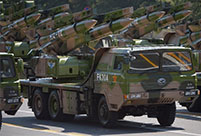


Syrian immigrants wait for vehicles to send them to a police station for registration in Vathy on Samos Island ofGreeceAug. 18, 2015. About 156,000 immigrants have entered Greece in the first seven months of 2015, increasing fivefold over the same period in 2014, according to the latest official data from Greek Police. The overwhelming majority are 89,000 Syrians and 32,000 Afghans fleeing war-torn regions. (Xinhua/Liu Yongqiu)
STRASBOURG, Sept. 11 -- New emergency measures have been announced by Jean-Claude Juncker, the president of the European Commission, and approved by the European Parliament to confront the massive influx of migrants and refugees on the Old Continent.
But this must not lead to forgetfulness on the limits of such a policy, or obscure the deeper causes of a global crisis that has no precedent since the end of the Second World War.
By the end of the summer, member states of the EU began taking drastic action to address the ongoing migration phenomenon. Under pressure from public opinion, stirred partly by the photograph of a young Syrian child drowned on a Turkish beach, European leaders began to take concerted action.
There have been internal divisions between EU member states and EU institutions. However, German Chancellor Angela Merkel's decision to suspend the Dublin Rule, which requires refugees to register asylum requests in the country where they have first arrived in Europe, helped achieve agreement on emergency measures.
Their objectives are to relieve Greece, Italy and Hungary, the ports of entry to the Schengen zone, and to confront the humanitarian crisis.
During his first State of the Union address, delivered in Strasbourg on Sept. 9, Juncker announced 120,000 asylum seekers -- in addition to the 32,000 in July -- would be distributed between EU member states.
He also announced a permanent refugee relocation scheme based on four criteria: GDP, population, unemployment rates and the number of asylum requests already registered in the country.
According to the International Organization for Migration (IOM), it is necessary to remember that 365,000 people have crossed the Mediterranean in order to reach the European coast since the beginning of the year, in contrast to 207,000 in total for 2014.
Syrians are the most represented group in these historic shifts of population. During the month of July alone, 110,000 people landed in Greece and Italy, double the number during the same period a year before. Last weekend, 20,000 arrived in Germany after having crossed the Balkans on foot.
European public opinion remains divided in regard to the refugee crisis.
But to the eyes of informed observers, European policy appears to be split between approaches based on solidarity and those based on security reflexes, especially under pressure from parties of the extreme right which are gaining ground.
All member states, including those opposed to refugee redistribution, have been called to take in refugees.
Given their exemption statuses, Britain, Ireland and Denmark have been invited to participate in a voluntary manner. However, British Prime Minister David Cameron announced on Sept. 7 his intention to accept 20,000 Syrians over the course of five years.
It is important to recall that Turkey, Lebanon and Jordan support the greatest number of those feeling Syria, receiving up to 86 percent of the refugees, according to the United Nations High Commissioner for Refugees.
Experts say this unprecedented migrant crisis is to a great degree one of the consequences and the collateral effects of the external interventions and intrusions of Western nations and their allies, notably in Afghanistan and in Iraq, and will continue in the long term.
Global measures must be taken in a concerted fashion in order to attack the roots of the problem.
In response, Juncker also announced special funds for Africa to "define very clearly" an array of measures concerning the migrant crisis and help stem the problems at the root.
The principal regions of origin of African migrants, such as in the region of Lake Chad, the Horn of Africa and North Africa should benefit from a new fund of more than 1.5 billion euros (1.7 billion U.S. dollars).
"The first objective of our strategy for develop within the frame of the migration crisis is reintegration or integration of people in their country of origin," said Neven Mimica, European Commissioner for International Cooperation and Development.
The migrant crisis dramatically impedes the development of the countries they flee, hobbling the possibilities for these states to overcome their economic difficulties.
It remains to be seen if European nations and EU funds will be able to mobilize at least 4 billion euros of supplementary public development aid per year, Mimica added.
The EU would then be in the position to maintain its promises and to dedicate 0.7 percent of its gross income to public development aid from now until 2020, as the Union committed itself to doing during the Third International Conference on Financing for Development held last July in Addis-Ababa.
 Models change clothes on street in Hangzhou
Models change clothes on street in Hangzhou Charming iron ladies in China's upcoming V-Day celebrations
Charming iron ladies in China's upcoming V-Day celebrations In pics: armaments displyed in massive military parade
In pics: armaments displyed in massive military parade Charming Chinese female soldiers
Charming Chinese female soldiers Volunteers required not taller than 5ft 5in
Volunteers required not taller than 5ft 5in  Czech pole dancing master teaches in Xi'an
Czech pole dancing master teaches in Xi'an Shocked! PLA smokescreen vehicle drill
Shocked! PLA smokescreen vehicle drill Foreigners experience tranditional Chinese wedding
Foreigners experience tranditional Chinese wedding Blind date with bikini girls in Nanjing
Blind date with bikini girls in Nanjing Living heritage
Living heritage More SOE reforms on the way
More SOE reforms on the way NYT shifts refugee crisis attention to China
NYT shifts refugee crisis attention to China Govt cracks down on editors accepting bribes to delete negative online reports
Govt cracks down on editors accepting bribes to delete negative online reportsDay|Week